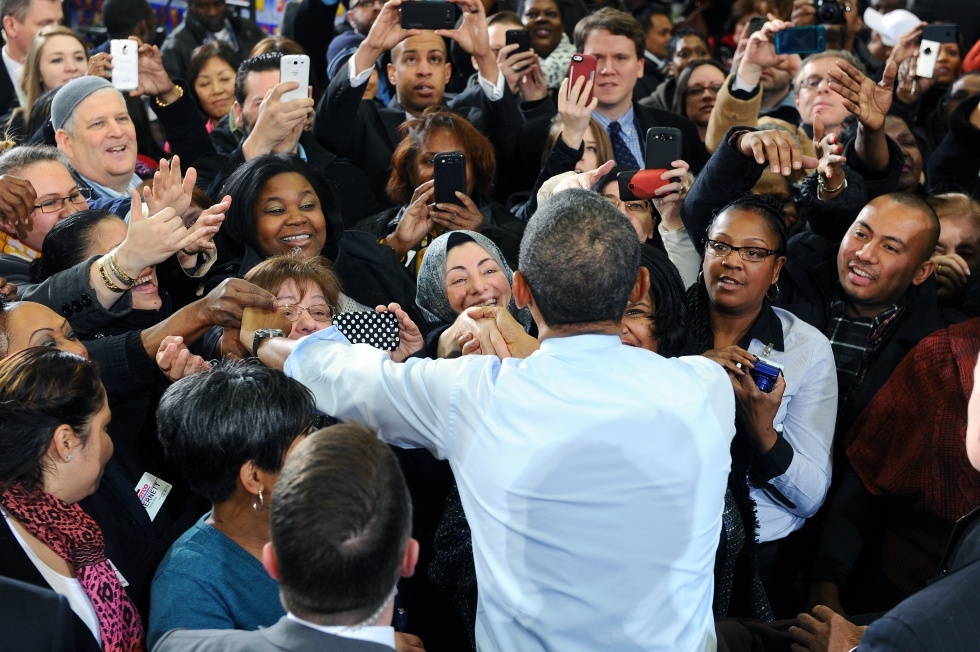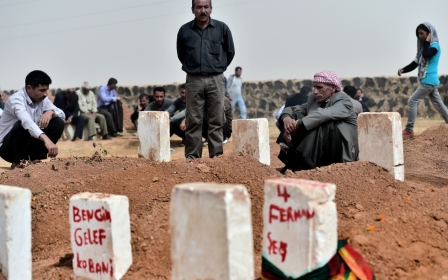Clueless: America's ignorance of the Middle East will shock you

The rapid escalation of the conflict in Iraq and Syria, coupled with Israel’s recent military assault of Gaza, has returned the Middle East to the forefront of both the nation’s media and collective consciousness. What happens next will depend largely on which way the political winds blow public sentiment.
Given the US has enormous interests in the Middle East, you would expect your average American to have a good grasp of what the national headlines mean. Especially as the US has invested more treasure, sold more arms, sent more soldiers, lost more lives, and fought more wars than in any other region in the world.
The American “way of life” is made affordable thanks to our unrestricted access to the Middle East’s cheap oil, and we go to great expense (lives and treasure) to guarantee this access. America’s 44 military bases in the region, some of which are the size of small cities, are not there because Kuwait, Iraq, Iran, and Saudi Arabia are popular destinations for American tourists.
Rapidly escalating tensions in the region require a response from US policy makers. Given the US remains a quasi-democracy (proto-plutocracy); policymaking often depends on “political will” and public sentiment, or rather, on informed voters. That’s where the problem begins.
According to the National Geographic-Roper Survey of Geographic Literacy, 63 percent of Americans cannot locate Iraq on a map. This is quite astonishing given, well, you know, we fought a 7 yearlong war there. More than two-thirds don’t know the year Israel declared its independence, and an equal amount wrongly believe Iran and Pakistan are Arab countries.
Even though the Middle East is central to our lives, Americans remain completely baffled by this region, its culture, its people, and its countries.
Alarmingly, this collective breathtaking level of ignorance travels all the way to the nation’s policy makers and law enforcement officials. A New York Times Op-Ed asked the question “Can You Tell a Sunni from a Shiite?” Jeff Stein writes, “Most American officials I’ve interviewed don’t have a clue. That includes not just intelligence and law enforcement officials, but also members of Congress who have important roles overseeing our spy agencies. How can they do their jobs without knowing the basics?”
In a series of interviews with senior US political leaders, Stein asked a simple and straightforward question: "Do you know the difference between a Sunni and a Shia?" The responses were tragically comical. "One's in one location, another's in another location," said US Congressman Terry Everett (R-AL), a member of the House intelligence committee, before conceding: "No, to be honest with you, I don't know." When Stein asked Congressman Silvestre Reyes (D-TX), chair of the House intelligence committee, whether al-Qaeda was Sunni or Shia, he answered: "Predominantly - probably Shia." Wrong!
Willie Hulon, chief of the FBI’s national security branch, was asked by Stein whether he thought that it was important for a man in his position to know the difference between Sunnis and Shiites. “Yes, sure, it’s right to know the difference,” he said. “It’s important to know who your targets are.”
Stein then asked, “Which one is Iran – Sunni or Shiite?” Hulon replied, “Iran and Hezbollah.” “But which are they?” Hulon took a stab: “Sunni.” Wrong!
For the record, the basic issue separating Sunnis from Shiites goes back to the question of who should have succeeded their prophet Muhammad. The Sunnis believe that successors can be elected, while Shiites believe successors should be a blood relative of the prophet.
Given a total collapse of Iraq would likely result in the escalation of a region-wide Sunni v Shiite or Arab v Persian war, America’s ignorance of the Middle East should trouble everyone, deeply. Ignorance leads to false assumptions, and then dire consequences.
“There are, of course, consequences to this lack of knowledge, all of which came into sharp focus in the lead up to the Iraq war. It was against the backdrop of ignorance that the US political leadership and their echo chamber in the media were able to sell the public on the war's ease, the belief that Americans would be welcomed as liberators, and the notion that once the dictator was overthrown, democracy would flourish,” writes James Zogby.
Washington DC neo-cons, like John McCain (R-AZ), Peter King (R-NY), Lindsey Graham (R-SC), the Israel lobby, new atheist luminaries, and the media arm of the Republican Party - Fox News - continue to mislead and contribute to America’s misunderstanding of the Middle East by manipulating the media. This is sometimes done by helping to plant false stories and by presenting false narratives that portray a fictitious “clash of civilizations.”
This collective illiteracy leads Americans to wrongly believe there is a military solution to the crisis in Iraq and has demanded we apply the label “terrorist” without understanding the motives and grievances of the respective actors, while simultaneously ignoring the cause-and-effect links in the chain of terrorism.
The obvious reason why Americans are so clueless about the Middle East is we don’t teach much about it in schools, even though more American taxpayer money goes to the Middle East than anywhere else in the world. The Middle East Studies Association, the US's premier organisation of academics specialising in regional studies, warned that its textbooks either outright ignored the Middle East or, when they dealt with it, conveyed "an oversimplified, naive, and even distorted image" of the region and its peoples.
A study commissioned by the Chicago Council on Foreign Relations found that most teachers "knew little or nothing about" the region and lacked the basic materials to provide their students with answers to the questions they were asking.
The failure of the US’s disparate education system is coupled with a political class that misleads, and a media class that not only conflates opinions with facts, but one that also does not have the nerve to question motives.
Our collective ignorance of the Middle East allows politicians and pundits to get away with speaking in Orwellian terms. The US public hears, “We must protect national interests,” and then, in turn, internalises that as, “Oh, well that sounds like a patriotic cause.” But the “national interest” is never named. The fact is the US has only two interests in the Middle East: oil and guns. We are addicted to their oil, and we move $55 billion worth of arms to the region.
America’s refusal to understand a region of the world that it is so engaged with is a “dangerous step backwards that threatens to widen the knowledge gap that has put the US at risk in the Arab and Muslim worlds.” While this geographic and cultural illiteracy remains, America will remain engaged in a forever-war with the Middle East, led by the incessant chants of those who wish to deceive us for the purpose of serving their own duplicitous motives.
- CJ Werleman is an opinion writer for Salon, Alternet, and the author of Crucifying America, and God Hates You. Hate Him Back. Follow him on twitter: @cjwerleman
The views expressed in this article belong to the author and do not necessarily reflect the editorial policy of Middle East Eye.
Photo: US President Barack Obama greets employees and other attendees after speaking at the Costco in Lanham, Maryland, on 29 January (AFP)
Middle East Eye propose une couverture et une analyse indépendantes et incomparables du Moyen-Orient, de l’Afrique du Nord et d’autres régions du monde. Pour en savoir plus sur la reprise de ce contenu et les frais qui s’appliquent, veuillez remplir ce formulaire [en anglais]. Pour en savoir plus sur MEE, cliquez ici [en anglais].





